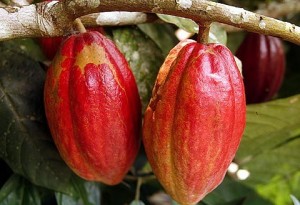ECA and partners discuss benefits of Regional Agricultural Value Chains for Ghana, Cote d’Ivoire
Ghana and Cote d’Ivoire are the two largest producers of cocoa in the world. While Cote d’Ivoire is the largest producer, Ghana follows a close second. The post ECA and partners discuss benefits of Regional Agricultural Value Chains for Ghana, Cote d’Ivoire appeared first on Ghana Business News.

 Ghana and Cote d’Ivoire are the two largest producers of cocoa in the world. While Cote d’Ivoire is the largest producer, Ghana follows a close second.
Ghana and Cote d’Ivoire are the two largest producers of cocoa in the world. While Cote d’Ivoire is the largest producer, Ghana follows a close second.
According to currently available data, the two countries account for more than 60 per cent of global cocoa production and exports but only recently, started to benefit 30 per cent of value added. In other words, Ghana and Cote d’Ivoire have only recently, together with other African countries, started to benefit up to 30 per cent of the more than $100 billion chocolate industry, it was far less in the past.
The Economic Commission for Africa (ECA) and its partners in the two countries have been meeting and deliberating on how to harness the two countries’ full agricultural potential. At an inception workshop in Accra Friday February 7, 2025, stakeholders, including agricultural scientists, economists, policy experts, CSOs, farmers, bankers, importers and exporters in the agricultural sector, met to discuss and figure out how to design and implement Regional Agricultural Value Chains (RAVCs) that would fully harness the agricultural potential of the two countries and bring about economic benefits.
The ECA indicates that the development of cross-border/Regional Agricultural Value Chains (RAVCs) is regarded as essential for an effective implementation of the African Continental Free Trade Area (AfCFTA) agreement by African Union (AU) member countries.
“The development of regional or cross-border AVCs forms part of the measures that are being championed under AfCFTA, towards the achievement of full regional integration. More specifically, the development of RAVCs or cross-border AVCs will enhance intra-Africa trade by making it possible for African countries to reach efficiency gains in production, but also to encourage the private sector businesses or establishments to get integrated into the global value chains,” it says in the workshop documents.
The main aim of the workshop in Accra was to strengthen the capacity of the countries to enable them to benefit from the AfCFTA, but that can only be achieved when the agricultural value chain has been properly developed.
The meeting also considered the guidelines and reforms that will promote value chains across regions in Africa.
These reforms, says Dr Joan Kagwanja of the ECA, will “enable efficiency, enhance employment and enable the youth to use technology like artificial intelligence to find jobs.”
She added that the workshop was also to identify other value chains important to Ghana.
The workshop emphasized the fact that agriculture constitutes almost 75 per cent of the economy of Africa and employs 57 per cent of all adults, and agriculture is a major source of hard currency for most countries in Africa.
Despite that, Africa’s share of global agriculture exports fell from 15per cent to four per cent.
In his presentation, Prof Ferdinand Ahiakpor, a leading agriculture expert and consultant, said achieving crossborder agriculture value chains will be key to attaining Agenda 2063.
He added that RAVCs, which will involve at least one activity taking place in more one country will boost intra-African trade.
“Agriculture contributes 35 per cent to the GDP of West Africa, employs 60 per cent of the active labour force and provides for about 300 million people,” he said.
He however, noted that low levels of technology, poor road networks hamper distribution of produce. He stated further that there are also no mechanisms for storage and as well as lack of irrigation infrastructure.
According to Prof Ahiakpor, intra-regional trade in agriculture accounts to 10 per cent of the region’s total agriculture exports.
The workshop organisers among other things noted the anticipated benefits to participating actors or operators participating in the cross-border (or internationalization of) agricultural value chains to include the capture of an important share of the value-added along the chain system and positive spill-overs such as skills and technologies transfers, as well as job creation opportunities and wage increases in participating countries.
“Additional benefits include enhanced trade and increased exports earnings through value additions to products, among participating countries, improved food security, development of local agro-industries, and significant efficiency gains in the region,” the organisers said.
In addition to cocoa, the workshop looked at other crops that can be included in the values chains between Ghana and Cote d’Ivoire.
By Emmanuel K Dogbevi
The post ECA and partners discuss benefits of Regional Agricultural Value Chains for Ghana, Cote d’Ivoire appeared first on Ghana Business News.














































